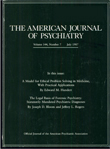TO THE EDITOR: The finding by Dr. Southwick and colleagues that PTSD is not directly related to the memory of traumatic events does not surprise me. After working with Vietnam veterans and adult survivors of child abuse for more than 20 years, I have become convinced that PTSD and dissociative disorders arise in response to confusion, shame, isolation, and possibly survivor guilt rather than trauma, pain, and abuse.
In one case a Vietnam veteran related his PTSD to an incident in which he thought he would be point man on a patrol. However, because of events outside his control this assignment was given to another member of his unit, who was then killed during the patrol. The subject felt that he was a coward because he had not insisted on retaining the point assignment, but he was too ashamed to share his feelings with other members of his unit. He felt isolated through the rest of his service time; PTSD subsequently developed. When the sequence of events and their connection to his PTSD became clear to him, he was able to share his memories with members of a PTSD group that he was attending. His level of functioning subsequently returned to normal.
Similarly, survivors of child abuse have told me again and again that they could have dealt with the actual abuse but could not deal with the sense of shame and guilt, the confusing physical sensations that result from sexual abuse, and the confusing multiple binds in which they were placed.
I postulate that there is a strong sense of shame associated with events during which PTSD symptoms arise. As a consequence, persons exposed to such events will not or cannot share these experiences with anyone, especially those closest to them (e.g., parents, other members of a combat unit). The fear of exposing a shameful secret makes these people feel that social situations are dangerous to them. They become hyperalert for fear that another might discover their secret.
The findings of Litz and colleagues (
1) that generic rewards of military service negatively predict PTSD could be reinterpreted by using the aforementioned hypothesis. I suspect that the positive feeling is not protective but, rather, can be developed only because the soldier was not exposed to any incidents that made him or her feel ashamed and consequently isolated. Of course, people who can deal with their shame and guilt by disclosing actions of which they are ashamed—as occurs in psychotherapy, especially in groups—would not develop PTSD or would be able to emerge from it. This may explain Litz and colleagues' finding that adult women, who are more prone to discuss their feelings with other women, do not suffer from PTSD as often as men (
1).
Finally, if my views are correct, memory of a traumatic incident is immaterial to the development of PTSD, dissociative identity disorder, or dissociative identity disorder not otherwise specified, since these conditions are the result of feelings, not memories. Indeed, since confusion plays a major role in the genesis of these conditions, memories may well be confused, distorted, or absent at some time and present at others.

